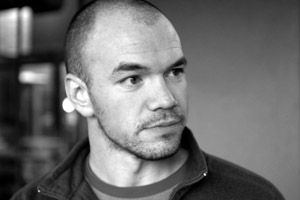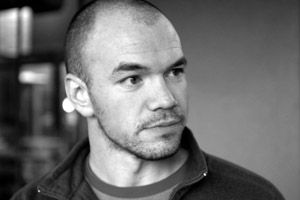
<a href="http://www.bidder70.org/galleryimages/view/136836/">Cliff Lyon</a>
During the final days of the Bush administration, the Bureau of Land Management (BLM) scheduled a controversial auction of oil and gas leases on federal lands, including areas bordering national parks and monuments in Utah. While environmental organizations launched a round of protests and lawsuits, Tim DeChristopher, a 27-year-old econ major at the University of Utah, decided he had to try to stop the sale by himself. Not knowing exactly how he’d do it, DeChristopher walked into the auction in Salt Lake City on December 19, 2008, and had a sneaky idea handed to him in the form of a bidder’s paddle. Simply by raising it again and again and pretending to bid on the leases, he proceeded to drive up their prices and outbid the real speculators on 13 parcels covering more than 22,000 acres and worth $1.7 million dollars.
When it became clear that bidder No. 70 was an impostor with no intention of paying for his purchases, federal agents removed him from the auction. But the damage was done. DeChristopher’s monkey-wrenching tainted the sale, forcing BLM to offer the other buyers the option of withdrawing their bids. That effectively postponed any final decision on the leases until February 2009, when the Obama administration would be in office. Soon after taking office, Secretary of the Interior Ken Salazar canceled the results of the chaotic auction and criticized the previous administration for allowing it in the first place.
Despite this reversal, DeChristopher was indicted in April on federal criminal charges of interfering with a government auction and making false representations. He faces up to five years in prison on each of the two counts and as much as $750,000 in fines. As his trial nears, DeChristopher and his lawyers hope to convince the judge to allow a “necessity defense,” an unusual tactic in which they would argue that his actions were justified because of the moral imperative of stopping catastrophic climate change—and because all legal means of stopping the auction had been blocked by the Bush administration due to its cozy relationship with the oil and gas industry.
DeChristopher, who has pleaded not guilty, tracks the progress of his case on his website, bidder70.org. Recently, he spoke about how the Yes Men helped inspire his brief stint as an oil speculator and why the climate movement needs to stop having fun and start considering civil disobedience.
Mother Jones: Were you inspired by the Yes Men at all??
Tim DeChristopher: About a year before this auction, I was at a public hearing for a renewable energy standards bill at the state legislature, and the room was packed. People were flowing into the hallway, and the chairman of the committee asked how many people were there to support this bill, and 50 hands went up. Then he asked how many people were there to oppose this bill, and five lobbyists from the power companies raised their hands. And so he said, “Well, we don’t have enough time for everyone and in the interest of fairness, let’s take five people from each side.” So all the lobbyists got to get their points across and only a tenth of the people, the citizens, did. The bill ended up getting shot down and I left really frustrated and upset. The person I was riding home with asked, “Have you ever heard of the Yes Men?” And I said no. So I looked them up and watched some of their videos and thought they were brilliant. Later that year I ended up walking into that auction and they said, “Are you here to be a bidder?” and I said, “Well, yes, I am,” even though I hadn’t planned that out at all. Having the model of the Yes Men—to take every opportunity to be that influential person who gets that right to speak and to influence our country—set the right example for me.?
MJ: What’s the current status of your case?
?TD: September 25 was the first hearing and the judge gave us 30 days to basically make our entire case in writing about why we should be able to use the necessity defense. I feel as though we have a very strong case with the necessity defense. In a federal court they give four requirements that you have to answer in order to use that defense, and I think we have very strong evidence for each of those four points. A lot of what it came down to in that first hearing was the fourth point, which is that there have to be no legal alternatives that would lead to the same effect and that would avoid that harm. That was the thing that the prosecution really emphasized; it said that I should have just worked within the system and filed an objection and let the system work. The prosecutor actually said, “The political process always works,” which I thought was really funny since he was talking about issues of oil drilling during the Bush administration.??
MJ: Does the judge seem favorable to you??
TD: I’m told that he’s a reasonable guy. During the first hearing he compared what I did to car bombing and said, “Well, if he thinks he can just do whatever he wants to stop climate change, what if he’s concerned about emissions coming out of vehicles and he blows up a car with somebody in it? Isn’t that exactly the same thing?” And we said, “No. That’s not the same thing at all.” I’m hoping that that didn’t come from a preestablished notion about the nature of what I was doing and that it was more of an off-the-cuff comment.
MJ: Does the fact that the Obama administration came out against the leasing process help you?
?TD: I really doubt it’s something they would spend any political capital on to avoid prosecuting me. It’s probably too far along in that process already. But it was definitely odd because I didn’t get indicted until April and the new secretary of the interior, Ken Salazar, came out in February and announced that they were reversing as much of this auction as they could because it was illegitimate. So they made the conscious choice to prosecute me for standing in the way of something they already said was a crime. ??
MJ: What first convinced you that nonviolent direct action was necessary to fight climate change??
TD: One of the epiphany moments was early 2008. I was at a symposium and ended up having a conversation with one of the IPCC officers, a woman who had won the Nobel Prize for her work on climate change. Privately she said to me, “There were things we could have done in the ’80s, things we could have done in the ’90s, but now it looks like it’s probably too late.” She said the IPCC couldn’t come up with any politically feasible scenario in which we avoided all these worst-case consequences. And she literally put her hand on my shoulder and said, “I’m sorry my generation failed yours.” That shattered me, and I went into a period of despair but also realized that if there’s no politically feasible scenario that’s going to get us there, then we have to change what’s politically feasible.??
MJ: I’ve heard you say that you don’t think the environmental movement has been effective. Why do you think that is?
?TD: I think the environmental movement has been focused on this path of incrementalism. I think part of that is because the climate movement grew out of the rest of the environmental movement, which focused on issues of wilderness preservation and wildlife preservation and more local issues. The climate movement adopted a lot of those strategies and tactics that weren’t really appropriate for being translated into the goal of stopping climate change, where incrementalism is completely inappropriate because getting halfway to preventing the collapse of our civilization isn’t really any better than being a quarter of the way or not there at all.
MJ: While the International Day of Climate Action on October 24 was a huge day for the climate movement and the lead-up to Copenhagen, I haven’t heard much about direct action being planned. It sounds like there were a lot more fun events. Do you think there should be more of an element of risk, like the use of civil disobedience, at this point??
TD: I’ve had this discussion with Bill McKibben about how hard we should be pushing with this, and I know that what they were trying to accomplish with October 24 is bring more people into the movement and send one unified message to the negotiators at Copenhagen. But I absolutely think we need to keep pushing it. All of the new people that we bring into the movement with the fun things that are going on—we need to hang on to those people and continue to motivate those people and challenge them to start taking more actions and bigger actions. Costing the fossil fuel industry money is the only thing that’s going to change the way they’re acting. With our political leaders, costing them political capital or costing them the kind of social peace that comes when everyone follows along and participates in the system are the only things that are going to work. Showing them that we’re not going to participate in a system that threatens our survival. That if they’re not going to protect our future, we will. There’ll just be a social uprising and social chaos as people do whatever they can to shut down this system that threatens our destruction.
??MJ: Should climate activists keep trying to grow the movement before considering escalating tactics?
TD: I’ve talked to a lot of people in the movement who think that we need to keep convincing more people of the reality of climate change and that the key to our success is getting every single person to understand the science of this. I don’t think that’s a worthwhile pursuit. Around 30 or 35 percent of population doesn’t believe in climate change and that’s pushing up against a limit in our society because that 30 to 35 percent is a number we see a lot. That’s about the number of people who don’t believe in evolution. In a couple of polls two and half weeks after Hurricane Katrina 35 percent said President Bush did an excellent job of dealing with that crisis. We’ve got this section of our population that lives on a different planet and experiences reality in a different way and I think it’s a hopeless battle to bring those people to reality. Historically that’s not how change happens. We didn’t get a civil rights act because the last redneck in Mississippi stopped being a racist. The problem is not that 35 percent of population still doesn’t get it; the problem is that 65 percent do get it and aren’t fighting.??
MJ: What do you think it will take to get more people to take a stand??
TD: It just takes some of us demonstrating that we’re not helpless and that we do have power to effect change in our society. The reason I was able to see my opportunity last December is that I went in believing that I could be an effective agent of change. I remember riding down [to the auction] thinking of all the impotent protests we’d been to before and decided that I was going to disrupt this auction one way or another. I didn’t know what that would look like; at that time I thought it would be standing up and making a speech or something like that. I remember making the commitment that I wouldn’t be helpless. That’s what we need on a much larger scale. We need to find ways to make people believe that they really are effective agents of change and that the people can change where this country’s headed.
Find Mother Jones‘ ongoing coverage of the Yes Men’s recent Chamber of Commerce prank (and other Chamber shenanigans) here.













